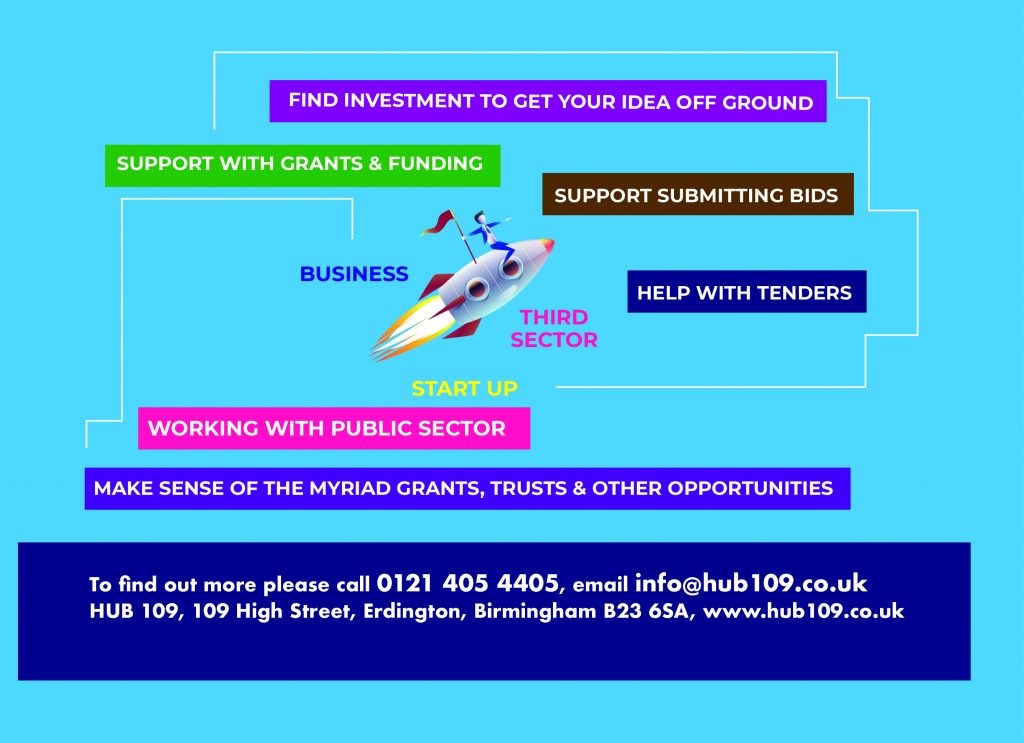
Hub 109 is continually scanning for bidding and tendering opportunities. Every month we will send you a selection of the most promising prospects and here are our first 5 recommendations. If any of them are of interest, give us a call to discuss it further. If you don’t see anything relevant to you, let us know the kinds of things you are looking for and we will cast the net wider!
Engineers, designers, developers, innovators, entrepreneurs or anyone with an idea for a simple product that makes an everyday task easier for a person living with dementia can now apply for support of up to £100,000 of funding and business support. Funding is available from the Alzheimer’s Society Accelerator Programme to develop either products or services which during the 12 months will be developed and evaluated to ensure that they will improve the lives of people affected by dementia, and are ready to scale up to support larger groups of people. As well as financial investment successful applicants will be supported by an expert innovation buddy from the Alzheimer’s Society. The closing date for applications is the 7th November 2019. Find out more.
Registered charities, churches, parish councils, local authorities and CASC registered sports clubs can apply for grants of between £2,000 and £100,000 for the provision, maintenance or improvement of community facilities. This can include village halls and community centres, public play areas; publicly available multi use games areas, skate parks and BMX tracks; sport and recreation grounds including pavilions and clubhouses with full public access; churches – community spaces only; nature reserves; public gardens, parks, country parks and woodlands with at least dawn to dusk access; and Museums. The funding is being made available through the FCC Community Action Fund and is available to projects located within 10 miles of an eligible FCC Environment site. The closing dates for applications at 5pm on the 11th December 2019. Find out more.
3. Grants of up to £1,000 Available for Projects that Improve the Wellbeing of Children (UK)
Grants of up to £1,000 are available to registered charities and non-profit organisations who work to improve the education and physical and emotional wellbeing of children. Applicants applying for funding may focus on one or more of these areas: Living in Poverty; Physical & Mental Health Problems; Health & Wellbeing; Living With Disability. Examples of grants awarded in the past include a grant of £5,000 to the Panathlon Foundation for the Panathlon Challenge for young people with disabilities, to fund tournaments and specialist equipment; and a grant of £2,500 JT Inspires to promote the fitness of children and young people with congenital heart disease. The funding is being made available through the Les Mills Fund for Children and the next closing date for applications is 5pm on the 18th November 2019. Find out more.
4. Funding of up to £20,000 Available to Develop Citizen Science (UK)
A new £400,000 fund will be launched to encourage researchers and innovators to experiment with citizen science. Citizen science is an important way in which diverse groups of people can participate and collaborate in research and innovation. This could include crowdsourcing data, working with volunteers to analyse existing datasets, collaborating with communities in designing research programmes, and approaches to innovation that involves diverse groups of people. Up to 20 successful applicants will receive up to £20,000 of funding to explore opportunities for building citizen science methodologies into their research. The funding is being made available by UK Research and Innovation and is available to all active UKRI grant holders. The fund will open for application on the 1st October 2019 and close for applications on the 12th November 2019. Find out more.
5. Grants of up to £30,000 to Apply Collective Intelligence to Solve Social Challenges (UK)
Grants of up to £30,000 are now available for non-profit organisations, charities, academic institutions, private companies, community organisations and local authorities to help grow the field of collective intelligence design. The funding is being managed by Nesta as part of the £500,000 Collective Intelligence Programme and will support experiments that help generate new insight and knowledge on how to design and apply collective intelligence to solve social challenges. Previous grants have funded topics ranging from improving group decision making to sustaining crowd engagement. The closing date for expressions of interest for this round is the 25th October 2019. Find out more.
If you do a bit of research you will find that coworking is a shared serviced office space where entrepreneurs, remote workers, consultants, freelancers, and anyone else who wants access to a fully-equipped office space can get membership. Co-working has evolved over the years into a much wider phenomenon and a lot of co-working spaces refer to themselves as a community of like minded individuals or business. This is due to the fact that it co-working spaces act as business networks and encourage their members to refer work or expertise to each other. There are those spaces which are more corporate and are primarily focused on serviced office model rather than community and they do have their advantages as well.
Co-working model also plays a huge part for those businesses that don’t necessarily need and office space but a place where they meet their clients or use the address for their business. Specifically this refers to using meeting room on ad hoc basis or business address to present themselves in a more professional light.
This brings us to 2019 and London is currently crowned the capital of coworking, with more coworking spaces than New York, San Francisco and Berlin. In Birmingham the co-working figure is a lot less in comparison but the sector has experienced exponential growth over the last few years.
To summarise the co-working is cost-efficient model which offers businesses flexible workspace with short term contracts, encourages sense of community and provides excellent networking opportunities for members.
HUB 109 ticks all of the above but we are also here to help local businesses grow and create number of long term benefits for the residents of Birmingham and wider. If you are a start-up or a business looking for co-working space outside of City Centre, Hub 109 is an ideal choice.
